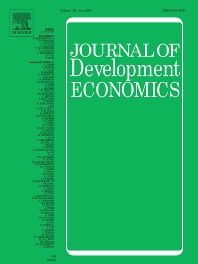Journals in Economic development
Journals in Economic development
Journal of Development Economics
The Journal of Development Economics publishes original research papers relating to all aspects of economic development - from immediate policy concerns to structural problems of underdevelopment. The emphasis is on quantitative or analytical work, which is novel and relevant. The Journal does not publish book reviews. We welcome papers that take up questions in development economics that are of interest to the general readers of the journal, and then use data from a particular country or region to answer them. However, we do not publish articles that are essentially in-depth studies of a specific country, region, case, or event whose findings are unlikely to be of great interest to the general readers of the journal. In our review process we pre-screen all papers, some of which are immediately rejected. This includes papers that are not considered to be a good fit in terms of the topic or the methodology even though development is a broad field and sometimes this is a matter of subjective judgment. This also includes papers that fall short of our high standards, in terms of the contribution or value added to the literature, or in terms of methodological rigor. The Journal receives approx. 1300 papers per year and publishes only a small fraction (around 6-8%). To make this work in a timely fashion we only send 1/4 papers out for review. Given this volume we regret that we cannot provide explanations on our desk reject papers. Under normal circumstances, an author cannot submit (either s/he directly or through a co-author) more than three papers within any 12 month period. Papers that are once rejected by the JDE will not be considered for publication again, even if the authors use a new dataset or a new model. This is only possible if the editor in his or her decision letter explicitly leaves open this possibility. Special submissions:Register... Reports: The JDE offers authors the opportunity to have their prospective empirical projects reviewed and approved for publication before the results are known (referred to as 'Registered Reports'). This pre-results review track may be particularly suitable for authors working on research projects for which they have not yet collected or accessed data. Submissions in this track will follow existing policies outlined in the Author Information Pack, including the Mandatory Replication Policy, but specific information is available in the JDE Registered Reports Author Guidelines. A website including the Guidelines and information on Phase 1 acceptances to data is available here. To submit a Registered Report, select "Registered Report Stage I: Proposal" as the article type in the submission portal. "Registered Report Stage II: Full Article" should only be used for articles derived from accepted Stage I submissions.Short Papers: The JDE offers the authors a short-paper limited revision track. Submission guidelines follow AER: Insights. Manuscripts should be at most 6,000 words, with at most 5 exhibits (tables or figures). Online appendices of at most 20 pages are permitted, but manuscripts must be self-contained. Submissions will be desk rejected, rejected after review, or conditionally accepted. Decisions on refereed manuscripts generally occur within 6-8 weeks of initial submission, faster than for standard-length papers.To submit a short-format manuscript, select "Short Paper" as the article type in the submission portal. In addition to the direct submission process, the editors will also monitor standard-format rejections to identify manuscripts that would meet the journal's standards if they were rewritten in short format. In such cases, informed by the referee reports on the original standard-format submission, the Insights Co-editor will invite a new submission of the manuscript in short form, with a commitment to publish without further review if the authors follow a clear set of revision instructions.- ISSN: 0304-3878

World Development
The Multi-Disciplinary International Journal Devoted to the Study and Promotion of World DevelopmentWorld Development is a multi-disciplinary monthly journal of development studies. It seeks to explore ways of improving standards of living, and the human condition generally, by examining potential solutions to problems such as: poverty, unemployment, malnutrition, disease, lack of shelter, environmental degradation, inadequate scientific and technological resources, trade and payments imbalances, international debt, gender and ethnic discrimination, militarism and civil conflict, and lack of popular participation in economic and political life.Contributions offer constructive ideas and analysis, and highlight the lessons to be learned from the experiences of different nations, societies, and economies. World Development recognizes 'development' as a process of change involving nations, economies, political alliances, institutions, groups, and individuals. Development processes occur in different ways and at all levels: inside the family, the firm and the farm; locally, provincially, nationally, and globally. Our goal is to learn from one another, regardless of nation, culture, income, academic discipline, profession or ideology. We hope to set a modest example of enduring global cooperation through maintaining an international dialogue and dismantling barriers to communication.Author... are also welcome to submit to the journal's companion title, World Development Perspectives .- ISSN: 0305-750X
